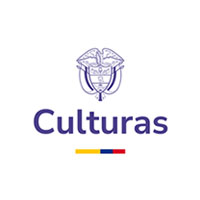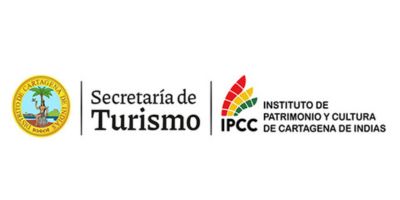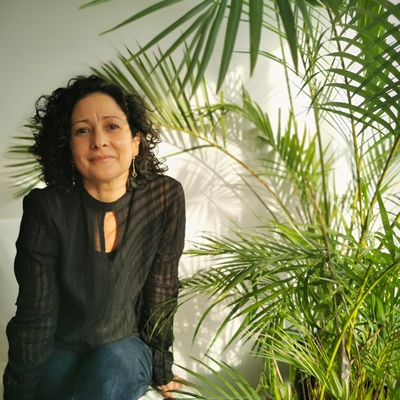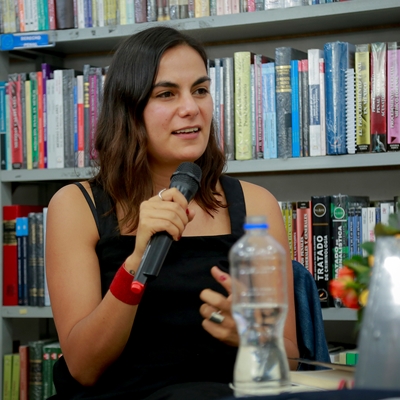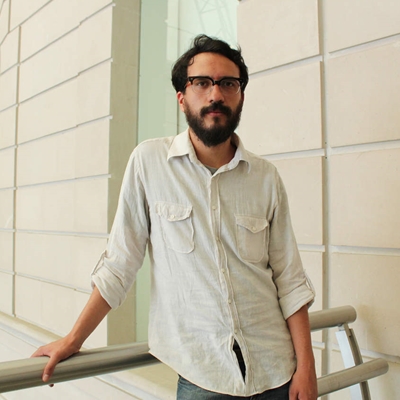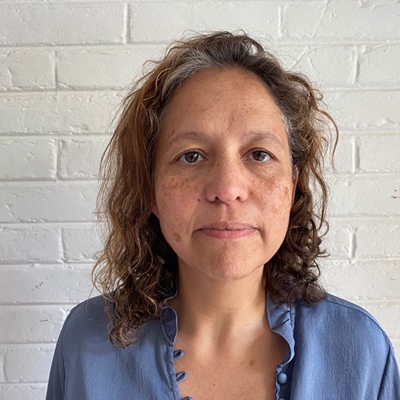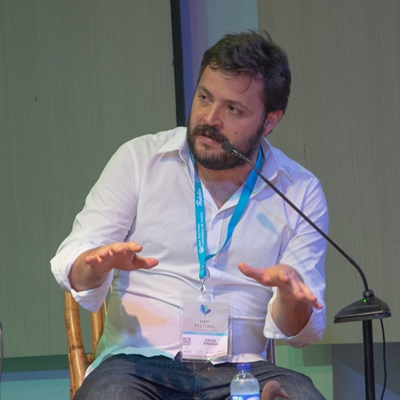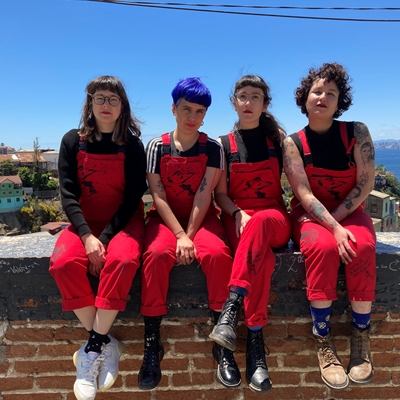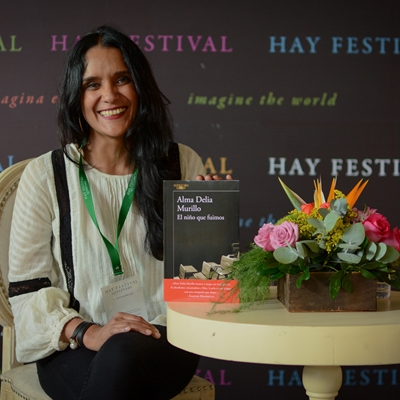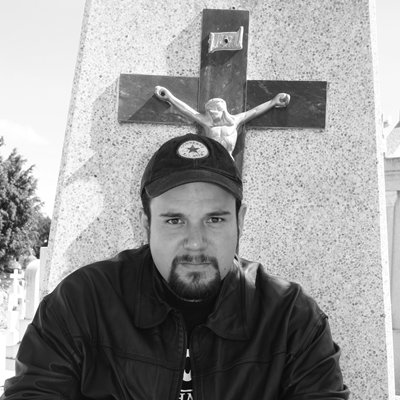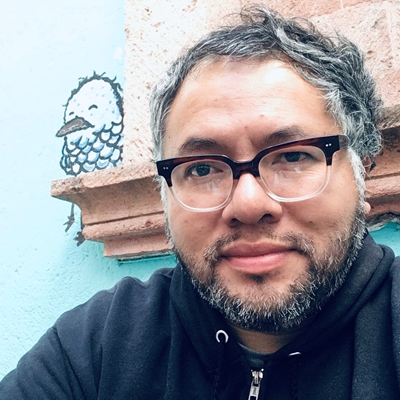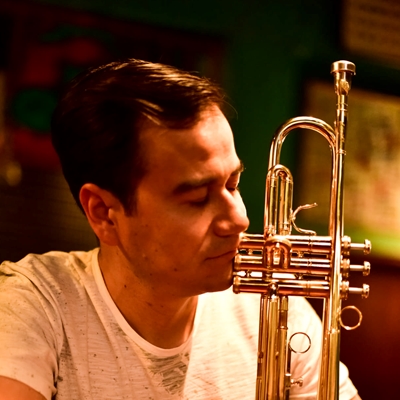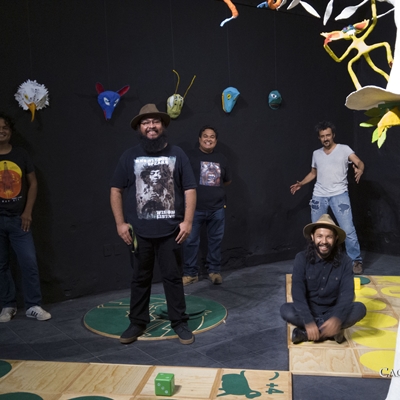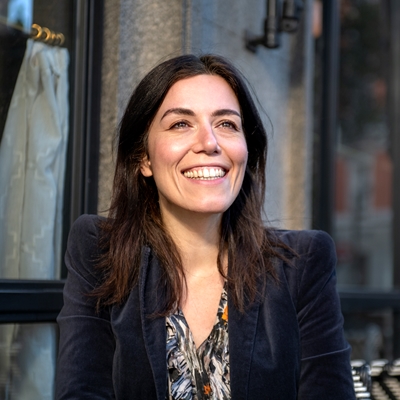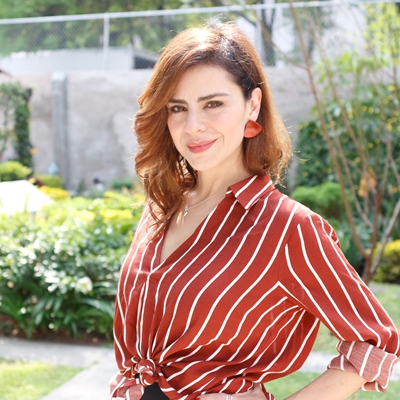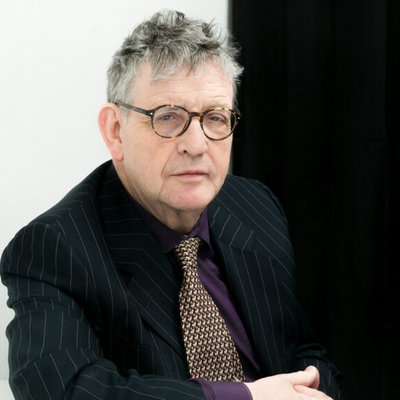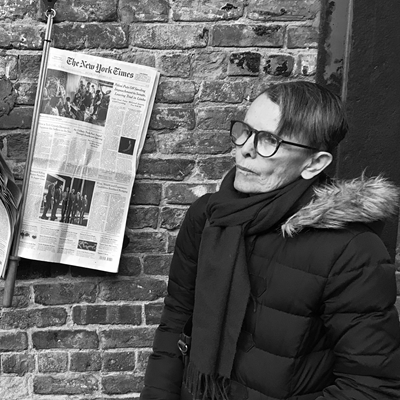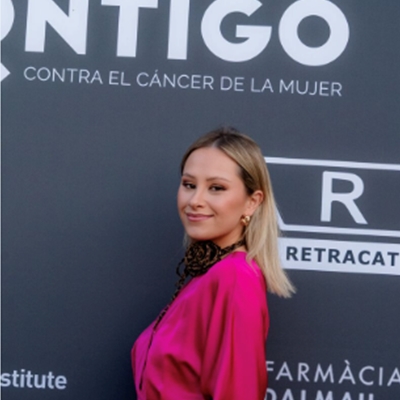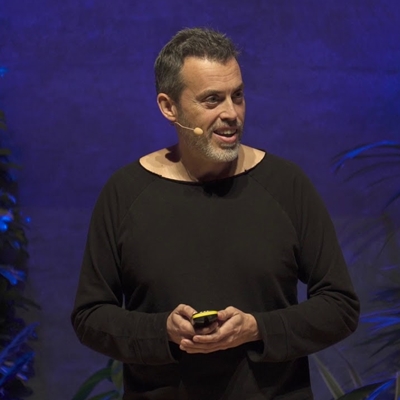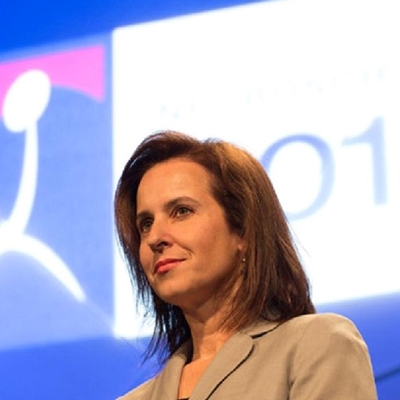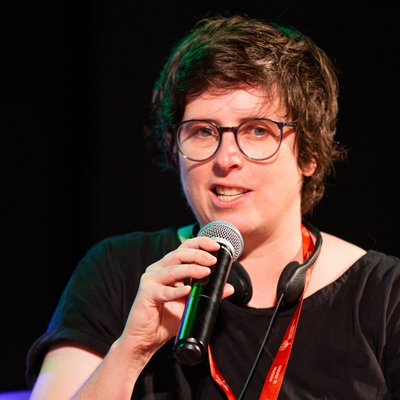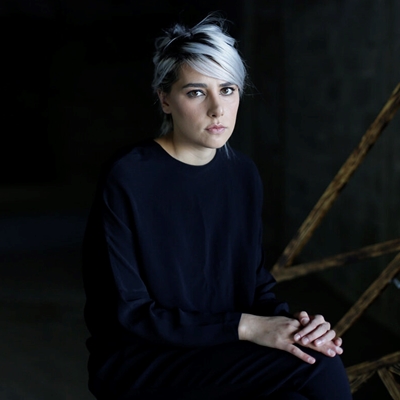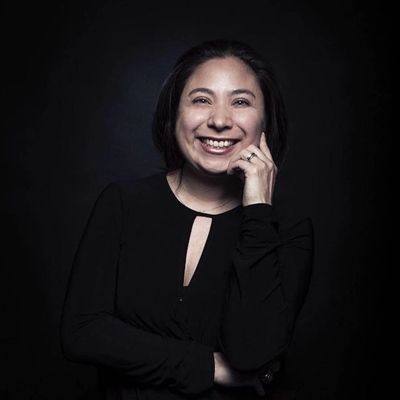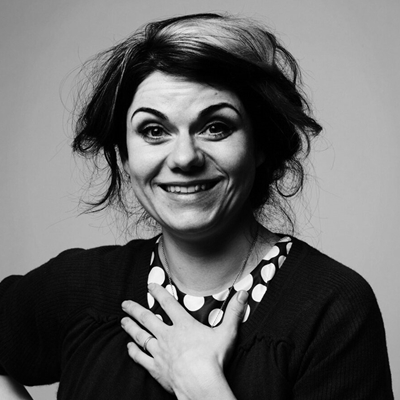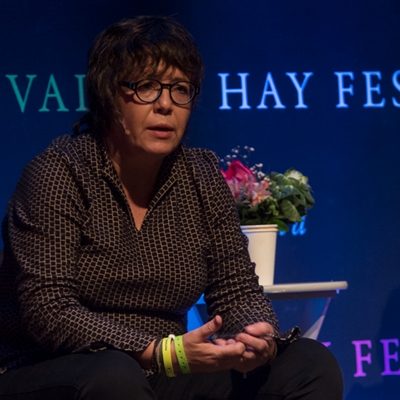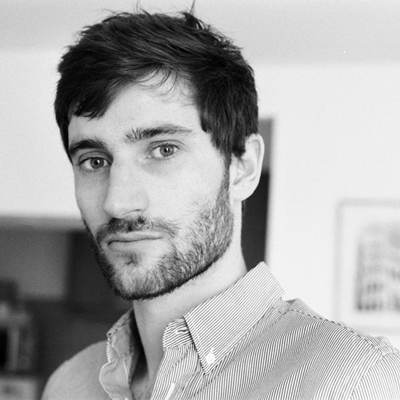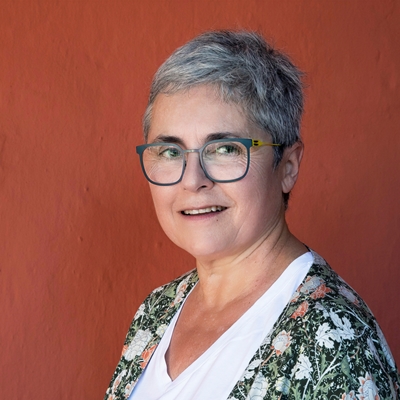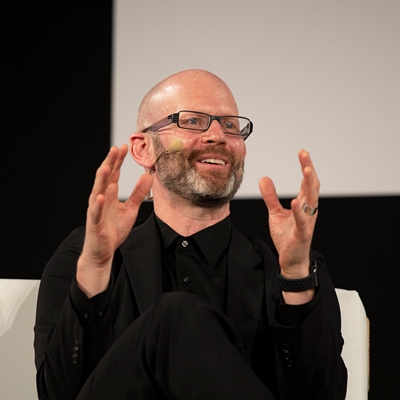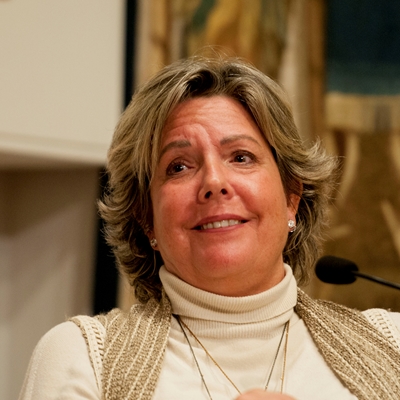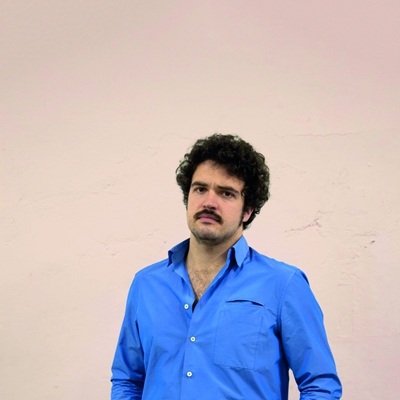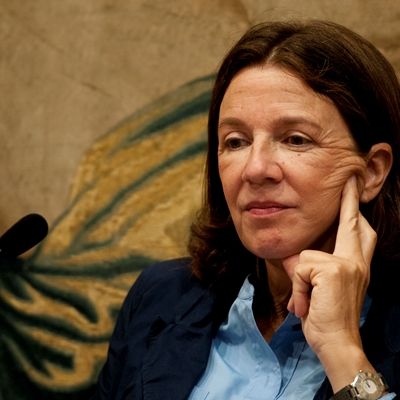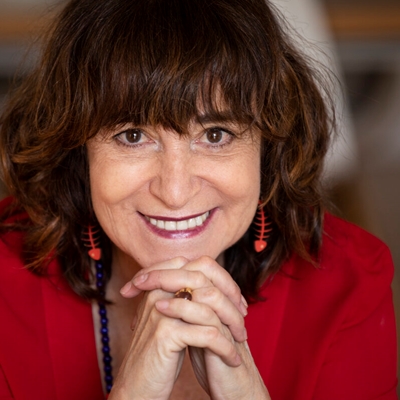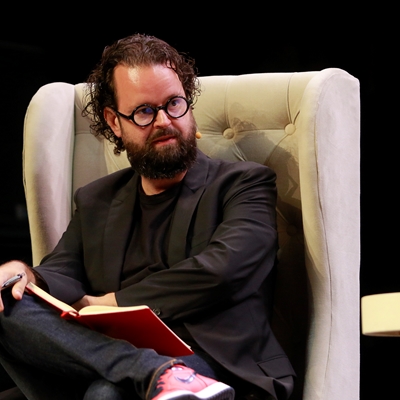Online events
Event 21
Amalia Andrade, the Colombian author of works such as Uno siempre cambia al amor de su vida (Por otro amor o por otra vida), Cosas que piensas cuando te muerdes las uñas and Tarot magicomístico de estrellas, has sold over a million books and is a social media phenomenon. In her most recent book, No sé cómo mostrar dónde me duele, Andrade returns to the theme of mental health and the body-mind relationship, writing about matters such as poetry, music and the cultivation of good habits to work on our emotional education and balance the internal world of the feelings. In conversation with Yuriria Sierra.
With Mexican sign language interpretation

Event 60
Pilar Quintana in conversation with Elvira Liceaga
Teatro de la Ciudad
Pilar Quintana (Colombia) is the author of five novels and a book of short stories, works that have been translated into over 15 languages. She has won the Biblioteca de Narrativa Colombia Award and the PEN Translates Award for The Bitch, and won the 2021 Alfaguara Novel Prize for Los abismos, which tells the story of Claudia, a girl who lives with her parents in an apartment full of plants in Cali, absorbing the fears and troubles of the adults who raise her. In conversation with Elvira Liceaga.
Buy books by Pilar Quintana at Librerías Gandhi
Register to watch onlineBuy Carolina y otras despedidas by Elvira Liceaga at Librerías Gandhi
Register to watch onlineBuy the books for this event
Event 0
Oleksandra Matviichuk in conversation with Mario Arriagada
Hay Festival & Lviv BookForum series
Teatro de la Ciudad
Oleksandra Matviichuk (Ukraine), is a lawyer and activist of the Center for Civil Liberties, awarded the 2022 Nobel Peace Prize together with Memorial. Human rights defender, works on Ukrainian and OSCE issues. She currently heads the human rights organization Civil Liberties and also coordinates the work of the Euromaidan SOS initiative group. She has experience in creating horizontal structures for the mass participation of people in human rights activities against attacks on rights and freedoms, as well as several years with her practice of documenting violations during armed conflicts. In 2016 she received the Defender of Democracy Award for her "unique contribution to the promotion of democracy and human rights" of missions to the OSCE. In 2017 she became the first woman to participate in the Ukrainian Emerging Leaders Program at Stanford University. She will talk with Mario Arriagada.
With simultaneous interpretation from English to Spanish
With the support of Open Society Foundations
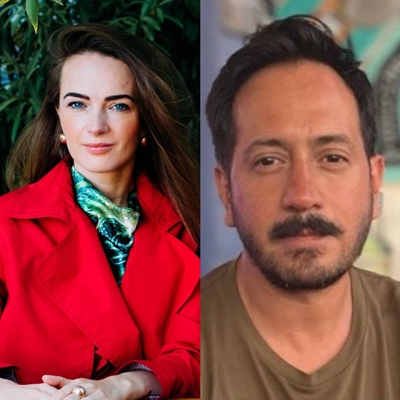
Event 61
Screening of Adrenalina, followed by a discussion with Alberto Arnault and María Sirvent in conversation with Diego Rabasa
Biblioteca Publica Rosario Castellanos
Adrenalina is a documentary about the Coahuila Youth Integration Centre. Teenagers and children who have stayed there offer their testimony and act in dramatic works through which they represent the realities that led them to be at the centre. The result is a view of both individual responsibility and also of systemic catastrophe, with the children using their own words and tools to express a fragile setting rarely seen in art, one that allows us to see the deep wounds that violence has caused in our country.
Duration of the documentary: 29 minutes
Event 62
LASTESIS in conversation with Alma Delia Murillo
Sede Digital Hay Querétaro
The performance created and led by the LASTESIS collective of the dance and song Un violador en tu camino in Santiago de Chile can be described as one of the most iconic moments in recent feminist activism. Performed all over the world, its strong message regarding the intrinsic violence of the patriarchal system points directly to matters that require urgent change in our societies, at the legal, social and cultural levels, in order to finally bring equality. Now, the collective presents Quemar el miedo (2021), a testimony of their struggle against sexist violence and oppression. In conversation with the writer and columnist Alma Delia Murillo.
Discover de story of the feminist collective that changed history with our BONUS TRACK on LASTESIS
Buy Quemar el miedo by LASTESIS at Gandhi
Register to watch onlineBuy El niño que fuimos by Alma Delia Murillo at Librerías Gandhi
Register to watch onlineBuy the books for this event
Event 25
Rebecca Solnit in conversation with Heather Cleary
Teatro de la Ciudad
The writer, historian and activist Rebecca Solnit is an important voice when it comes to matters such as feminism, environmental and urban history, popular power, social change and insurrection, walking and wandering, hope and catastrophe. She is the author of over 25 books, including the anthology she co-edited in 2023, Not Too Late: Changing the Climate Story from Despair to Possibility, as well as Orwell’s Roses, Hope in the Dark, Men Explain Things to Me, A Paradise Built in Hell and A Field Guide to Getting Lost. She writes regularly for The Guardian and is on the board of the climate group Oil Change International. On this occasion she will talk about her work with Heather Cleary.
Simultaneous interpretation from English to Spanish available

Event 63
Since 2006 when he appeared on the Mexican literary scene with El buscador de cabezas, Antonio Ortuño has established himself as one of the most talented and original contemporary writers. He was on the first list of Granta magazine’s 25 best Spanish-language writers under 35. His novel Recursos humanos was shortlisted for the Herralde Novel Prize and he also won the Ribera del Duero International Prize for Short Fiction for his book of short stories La vaga ambición. His work has been translated into over ten languages and he has contributed to media outlets such as El País, Clarín, Proceso, Etiqueta Negra and Letras Libres. He is a founder member of the punk band, Los Magones. His most recent book is the collection of short stories Esbirros (2021). In conversation with Rafael Volta.
Buy books by Antonio Ortuño at Librerías Gandhi
Register to watch onlineBuy the book for this event
Event 29
Kailash Satyarthi in conversation with Mario Arriagada
Teatro de la Ciudad
Kailash Satyarthi (India) was awarded the Nobel Peace Prize in 2014 for his work against child exploitation. He has rescued tens of thousands of children from slavery. An example of effective activism that has changed lives. In conversation with Mario Arriagada.
Simultaneous interpretation from English to Spanish available
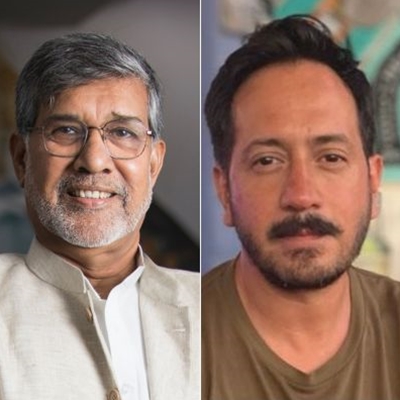
Event 64
Armando Servín Quintet and La Rumorosa Blues in concert
Teatro de la Ciudad
The grand final concert opens with the spectacular Armando Servín Quintet, a project that was founded in October 2014 and whose mission is to disseminate jazz among the new generations; and continues with the La Rumorosa Blues Band, a music ensemble from Queretaro state, founded in 2010, dedicated to experiments in the composition and performance of the blues, in all its varieties and sub-genres, creating a unique musical proposal that they call “rocknblues”. With Pek Santiago (vocals and guitar), Favio Olvera (keyboards), Jorge Cuenca (bass), Jorge Mejia (drums) and Poncho Ortiz (guitar).
Event 33
Colin Greenwood in conversation with El Cha
Teatro de la Ciudad
Colin Greenwood, the bass player with Radiohead, one of the world’s most popular rock bands, visits the Hay Festival in Queretaro to present How to Disappear, a kind of visual diary about Radiohead, created based on 20 years of photos in the band’s dressing rooms and rehearsal spaces and at concerts. The images are accompanied by the musician’s own texts, which offer a viewpoint onto the creation and execution of the music of Radiohead, in a kind of intimate portrait of one of the most influential bands in history. He will talk to a legend in his own right, the musician and bassist of bands such as Fobia and Moderatto, el Cha.
Colin Greenwood will participate in this event digitally.
Simultaneous interpretation from English to Spanish available
With the support of the British Council
Event 38
Javier Moro in conversation with Daniel Pardo
Teatro de la Ciudad
The acclaimed Spanish writer will talk about his most recent books. Javier Moro, one of the most read contemporary Spanish-language writers, is also a journalist and has worked as a scriptwriter and film producer in Hollywood. His books include Senderos de libertad (1992), El pie de Jaipur (1995), The Mountains of the Buddha (2009), Five Past Midnight in Bhopal (2002, written with Dominique Lapierre), Passion India (2007), The Red Sari (2015), El imperio eres tú (2011 Planeta Prize) and the recent Nos quieren muertos, which he will talk about at this event. This rigorous, frenetic work portrays the life of a figure who is central to understanding Venezuela today: Leopoldo López, who, after being jailed in 2014 because of his leading role in the mass protests against the Nicolás Maduro government, became a symbol for the struggle for democracy in the country. In conversation with Daniel Pardo.
Event sponsored by SURA
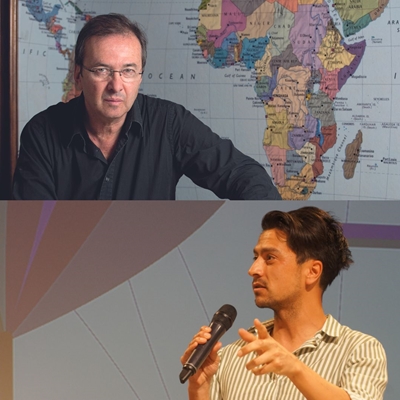
Event 7
Marta Peirano in conversation with Olivia Zerón
Teatro de la Ciudad
Marta Peirano (Spain) is a journalist and researcher who specialises in the relations between power and technology. Her work is known for its critical and analytical insights, investigating the dangers of concentrated power structures and addictive digital dynamics, and has received international recognition. Her latest book is Contra el futuro, resistencia ciudadana contra el feudalismo climático. According to her, there are solutions to climate change within our reach and her book sets out some strategies for citizen action in order to counter the acceleration of climate feudalism and disaster capitalism; a new anti-apocalyptic approach that builds hope for the future. In conversation with Olivia Zerón.
With the support of SURA
Event 11
Paul Muldoon in conversation with Pura López Colomé
Teatro de la Ciudad
The poet Paul Muldoon has been writing and publishing poetry for over five decades. He has been Poetry Editor at The New Yorker, has won the Pulitzer Prize for Poetry and the International Griffin Poetry Prize, among many other awards. He was Professor of Poetry at Oxford, President of the UK’s Poetry Society and is currently Professor in the Humanities at Princeton University. He has published over 30 poetry books, the most recent one published in Spanish being Elegías. He will talk to the Spanish translator of his work, Pura López Colomé.
Simultaneous translation from English to Spanish available
Event 8
Sara Abad, Pilar Cortada, Xavier Ginesta and Susana Martínez-Conde talk to Mohamed El Amrani
Inauguration of Hay Festival Segovia. The Human at the Centre: Science and Creativity
IE University. Aula Magna
In a world where advances in technology will enhance our efficiency and perform many of our tasks for us, creativity and other essentially human skills will become increasingly valuable.
In this inaugural panel the young singer and environmental activist Sara Abad, the Galician neuroscientist, professor and researcher in New York; Susana Martínez-Conde, the pilosopher Pilar Cortada, director of Eina Obra —an initiative aimed at promoting the transition towards socially and ecologically sustainable practices through design and art— and professor at the State University of New York; the author of books on the human essence and technology entrepreneur Xavier Ginesta and other guests will take part in this discussion about the brain and its relationship to creativity along with the winner of the 2014 Princesa de Girona Social Award and Community Builder of Banco Sabadell Foundation, Mohamed El Amrani.
There will be a book signing at the end of the event in the room next to the entrance of IE University
With simultaneous translation from Spanish to English
Organised together with Banco Sabadell Foundation, Telefónica Foundation, IE Foundation and Acción Cultural Española (AC/E)
Event 12
Selected as one of the best young British novelists by Granta magazine in 2023, Eley Williams's short fiction appears in anthologies including The Penguin Book of the Contemporary British Short Story, Pilot Press's Modern Queer Poets and Liberating the Canon, edited by Isabel Waidner. A Fellow of the Royal Society of Literature, her debut collection Attrib. and other stories won the James Tait Black Memorial Prize for fiction and her novel The Liar's Dictionary; in which she unpacks how rigorous and also absurd language can be, won a 2021 Betty Trask Award and was named one of The Guardian books of the year.
Williams will discuss her work, her influences and her view of contemporary literature with Cristina Ward, British Council in Spain’s Head of Arts.
There will be a book signing at the end of the event in the room next to the main entrance
Event in English
Organised together with British Council along with Sexto Piso
Event 15
Gisela Leal in conversation with Mayra González and Denise Maerker
On childhood, family and other mishaps. Searching for identity in the narrative universe of Gisela Leal
Teatro de la Ciudad
Gisela Leal published her first novel aged 24, making her the youngest author to be published by the famous Alfaguara house. El club de los abandonados (2011) was shortlisted for the Alfaguara Prize, and is a novel about excess and decadence in high society, expressed through the tragic and opulent lives of her characters. She later published El maravilloso y trágico arte de morir de amor (2015), a story that unfolds through a continuous conversation between a young women and a writer who, in cities such as New York, Mexico City and Barcelona, try to find company in their loneliness, telling each other how they have reached that point in their lives. Her third novel, Oda a la soledad y todo aquello que pudimos ser y no fuimos porque así somos (2017) tells the story of a family that enjoys fortune and social prestige in the eyes of others. However, one of the heirs seems to embody an error in the family system: he is a potential suicide who reveals the faults, absences and unbridgeable distances that exist among its members. Leal has also published stories in the magazines Eñe and P Magazine. On this occasion, she will talk about her work with her editor, Mayra González, and with the journalist Denise Maerker.
Event 19
Caitlin Moran in conversation with Gabriela Warkentin
Teatro de la Ciudad
Caitlin Moran (United Kingdom) won a British Press Award for Best Columnist of the Year in 2010 and two more for Best Critic and Best Interviewer in 2011. She is the author of the award-winning book of non-fiction How To Be a Woman (2014), a testimony that has been considered essential reading for our times. She now presents More Than a Woman (2022), which takes up the concerns of the previous book from the perspective of a woman aged over forty and deals with the new issues that arise with age: sexuality, changes in one’s body, professional life, motherhood, domestic life, relations with teenagers and older people… Caitlin Moran has written a brave and intimate manifesto about the life experiences of a middle-aged woman in the 21st century. In conversation with Gabriela Warkentin.
With the support of the British Council
Event 13
François-Henri Désérable in conversation with Eva Orúe
Iran: a Journey of No Return?
IE University. Sala Capitular
François-Henri Désérable returned from a long trip to Iran after the harsh repression of the uprisings of 2022 with a sense of powerlessness over his experience and the need to tell the story. Arrested by the Revolutionary Guards, he was forced to leave the country. Yet the plan had been so much more peaceful: to follow in the footsteps of travel writer Nicolas Bouvier in Iran. He was already on the outbound plane when it all went wrong with a phone call urging him to turn around as his life could be in danger. From this bitter experience was born the book L’Usure d’un monde: une traversée de l’Iran. ('The Wear and Tear of a World. A Journey through Iran'). Born in 1987, Désérable featured on the prestigious Blanche de Gallimard 2013 list of authors, with Tu montreras ma tête au peuple, a novel set in the French Revolution. With Évariste he won prizes such as the Geneviève Moll Biography and Histoire de Paris. He established himself as one of the best writers of his generation by winning the Grand Prix de l'Académie Française 2021 with Mon maître et mon vainqueur.
Désérable will talk to Eva Orúe, journalist, writer, cultural manager, and director of the Madrid Book Fair. The event will be introduced by Isabelle Berneron, attaché for books, ideas and media networks at the Institut Français D'Espagne.
There will be a book signing at the end of the event in the lecture room next to the entrance
With simultaneous translation from French to Spanish
Organised together with Institut Français and Editorial Cabaret Voltaire
Event 15
David Goodman talks to Simoneta Gómez-Acebo, Miguel Leiro and Belén Llamas Ferrier
Tradition and Innovation: Craftsmanship and Technology in Design
IE University. Sala Capitular
Craft and technology fuse in the realm of design, creating a landscape where tradition meets innovation and the past is preserved and reinvented through the use of contemporary tools. This event will delve into this intricate relationship and explore how cutting-edge technology can elevate and protect craftsmanship. From artisanal techniques to digital advances, join us as we discover the symbiotic fusion that honours and transforms the rich heritage of design. David Goodman, Dean of IE School of Architecture and Design will converse with Simoneta Gómez-Acebo, representative of the Michelangelo Foundation for Creativity and Craftsmanship and active member of the Contemporary Association of Arts and Crafts, Belén Llamas Ferrier, president of the Contemporary Association of Arts and Crafts and Miguel Leiro, designer, curator, and educator founder of Office of Design and curator of the MAYRIT Bienal a leading experimental architecture and design platform.
Event in English with simultaneous translation to Spanish
Organised together with IE Foundation, along with IE University School of Architecture and Design
Event 23
Based on her personal experiences and from a study of psychology, neuroscience, literature and memoires of great artists from different creative fields, the renowned Rosa Montero (Spain) presents us an intriguing look at the links between creativity and mental instability in her most recent book, El peligro de estar cuerda. This offers readers numerous curious insights into how our brain works when we create, identifying those aspects that influence creativity and putting them before the reader’s eyes as she writes, like a detective bringing together the various clues involved in an investigation. In conversation with the journalist of the American edition of El País, Javier Lafuente.
With the support of El País and UNAM
Explore All Genres
- Afrodescendencias
- Latin America
- South to North
- Art
- Arts & Culture
- Children
- Culture
- Design
- Drawing
- Economics
- Equality
- Fashion
- Film
- Food
- Gender
- History
- Human Rights
- Indigenous Cultures
- Journalism
- Language
- Law
- Literature
- Music
- Nature & Environment
- Philosophy
- Photography
- Podcast
- Poetry
- Politics
- Psychology
- Religion
- Science
- Sport
- Technology
- Theatre
- Workshops
- World Affairs
Partner for Latin America

Principal Sponsors


Government Partners
